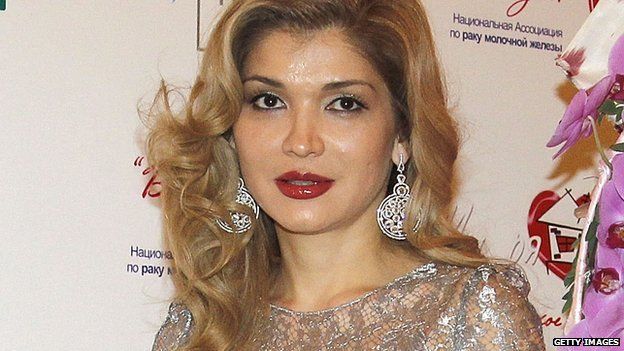The secret recordings of Gulnara Karimova
- Published

Gulnara Karimova, the daughter of Uzbekistan's president, used to be one of the most powerful people in Central Asia. But now, in secret recordings obtained by the BBC, she says she and her teenaged daughter are being treated "worse than dogs" and need urgent medical help.
The soft, accented voice is easy to recognise. "We need medical help urgently… We have this opportunity to send a USB stick out of the country, we will appreciate any help," Gulnara Karimova says. All the messages on the memory stick are in English, an acknowledgement that she doesn't expect help to come from within Uzbekistan.
Karimova, 42, used to be the glamorous face of one of the most brutal, isolated and secretive regimes on earth, one often compared to North Korea. But that was before her dramatic and public falling out with her strongman father, President Islam Karimov.
Listen to an extract of Gulnara Karimova's recording
In March, I received and authenticated a handwritten letter from Karimova, in which she said she and her daughter had been placed under house arrest. The letter was her last public communication until this month, when the short audio recordings were smuggled out of Uzbekistan. In them, Karimova says that their situation has deteriorated greatly.
"The territory of the house is basically surrounded now by hundreds of cameras and special equipment which is blocking any means of communication. So it's tremendous pressure and stress on me and my daughter. We need medical help urgently," Karimova says in one of the recordings.
Throughout the recordings she repeats her concerns for her 16-year-old daughter Iman. According to Karimova's son Islam Karimov Jr, a student at Oxford Brookes University, Iman has always worn a monitoring device for a heart condition that she has suffered from since childhood. But the device, he says, has now been taken away and she has missed an annual round of treatment. Karimov Jr adds that his mother is also in need of surgery, and that since the recordings were smuggled out the pair may have even been denied access to food.
Uzbekistan has a history of human rights violations. Andrew Stroehlein from Human Rights Watch says that next month his organisation will publish a report on dozens of wrongfully imprisoned people in the country, whose cases are backed by "multiple sets of corroborating evidence from reliable sources, gathered through months of painstaking research".
But he says the problem with the "Gulnara Case" is that all of it comes from a single source - herself.
Stroehlein is cautious when it comes to Karimova's recent concern for human rights in Uzbekistan, since it follows a decade-long period when the woman known as "Googoosha" wielded immense power in the country. "She almost certainly had top-level regime access to critical information regarding serious and systematic rights abuses in Uzbekistan, and she has had many opportunities to hand that information over to journalists and human rights groups," he says . "She hasn't."
Uzbekistan's embassy in London did not comment on Karimova's allegations or situation.
More from the Magazine
Before her Twitter feed went quiet in February, Gulnara Karimova exchanged a number of tweets with Natalia Antelava.
Karimova's messages, whether in Russian or broken English, were elusive and full of riddles, but still projected a shaft of light on the bizarre world of Uzbek politics.
Antelava's feature, published in January 2014, charted "Googoosha's" very public fall from grace.
Subscribe to the BBC News Magazine's email newsletter to get articles sent to your inbox.